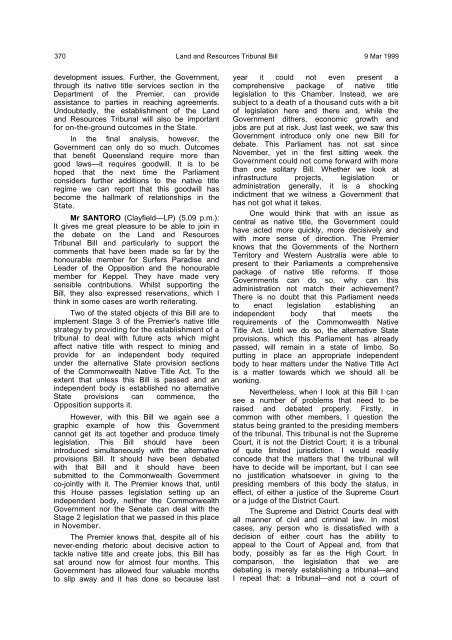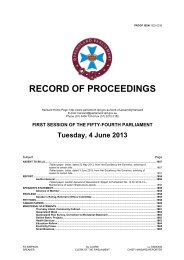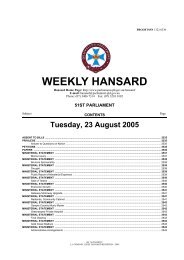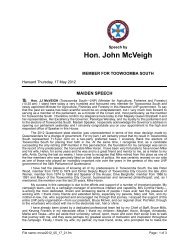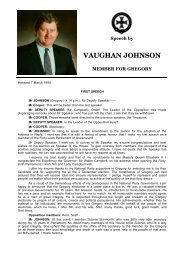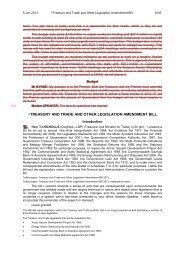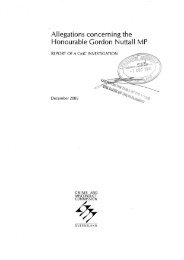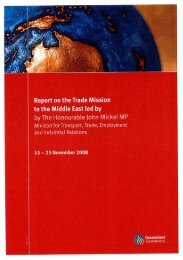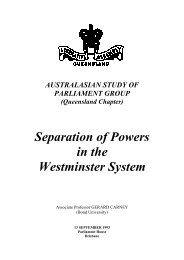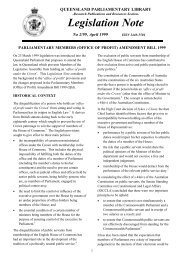Full transcript - Final - Queensland Parliament - Queensland ...
Full transcript - Final - Queensland Parliament - Queensland ...
Full transcript - Final - Queensland Parliament - Queensland ...
Create successful ePaper yourself
Turn your PDF publications into a flip-book with our unique Google optimized e-Paper software.
370 Land and Resources Tribunal Bill 9 Mar 1999<br />
development issues. Further, the Government,<br />
through its native title services section in the<br />
Department of the Premier, can provide<br />
assistance to parties in reaching agreements.<br />
Undoubtedly, the establishment of the Land<br />
and Resources Tribunal will also be important<br />
for on-the-ground outcomes in the State.<br />
In the final analysis, however, the<br />
Government can only do so much. Outcomes<br />
that benefit <strong>Queensland</strong> require more than<br />
good laws—it requires goodwill. It is to be<br />
hoped that the next time the <strong>Parliament</strong><br />
considers further additions to the native title<br />
regime we can report that this goodwill has<br />
become the hallmark of relationships in the<br />
State.<br />
Mr SANTORO (Clayfield—LP) (5.09 p.m.):<br />
It gives me great pleasure to be able to join in<br />
the debate on the Land and Resources<br />
Tribunal Bill and particularly to support the<br />
comments that have been made so far by the<br />
honourable member for Surfers Paradise and<br />
Leader of the Opposition and the honourable<br />
member for Keppel. They have made very<br />
sensible contributions. Whilst supporting the<br />
Bill, they also expressed reservations, which I<br />
think in some cases are worth reiterating.<br />
Two of the stated objects of this Bill are to<br />
implement Stage 3 of the Premier's native title<br />
strategy by providing for the establishment of a<br />
tribunal to deal with future acts which might<br />
affect native title with respect to mining and<br />
provide for an independent body required<br />
under the alternative State provision sections<br />
of the Commonwealth Native Title Act. To the<br />
extent that unless this Bill is passed and an<br />
independent body is established no alternative<br />
State provisions can commence, the<br />
Opposition supports it.<br />
However, with this Bill we again see a<br />
graphic example of how this Government<br />
cannot get its act together and produce timely<br />
legislation. This Bill should have been<br />
introduced simultaneously with the alternative<br />
provisions Bill. It should have been debated<br />
with that Bill and it should have been<br />
submitted to the Commonwealth Government<br />
co-jointly with it. The Premier knows that, until<br />
this House passes legislation setting up an<br />
independent body, neither the Commonwealth<br />
Government nor the Senate can deal with the<br />
Stage 2 legislation that we passed in this place<br />
in November.<br />
The Premier knows that, despite all of his<br />
never-ending rhetoric about decisive action to<br />
tackle native title and create jobs, this Bill has<br />
sat around now for almost four months. This<br />
Government has allowed four valuable months<br />
to slip away and it has done so because last<br />
year it could not even present a<br />
comprehensive package of native title<br />
legislation to this Chamber. Instead, we are<br />
subject to a death of a thousand cuts with a bit<br />
of legislation here and there and, while the<br />
Government dithers, economic growth and<br />
jobs are put at risk. Just last week, we saw this<br />
Government introduce only one new Bill for<br />
debate. This <strong>Parliament</strong> has not sat since<br />
November, yet in the first sitting week the<br />
Government could not come forward with more<br />
than one solitary Bill. Whether we look at<br />
infrastructure projects, legislation or<br />
administration generally, it is a shocking<br />
indictment that we witness a Government that<br />
has not got what it takes.<br />
One would think that with an issue as<br />
central as native title, the Government could<br />
have acted more quickly, more decisively and<br />
with more sense of direction. The Premier<br />
knows that the Governments of the Northern<br />
Territory and Western Australia were able to<br />
present to their <strong>Parliament</strong>s a comprehensive<br />
package of native title reforms. If those<br />
Governments can do so, why can this<br />
administration not match their achievement?<br />
There is no doubt that this <strong>Parliament</strong> needs<br />
to enact legislation establishing an<br />
independent body that meets the<br />
requirements of the Commonwealth Native<br />
Title Act. Until we do so, the alternative State<br />
provisions, which this <strong>Parliament</strong> has already<br />
passed, will remain in a state of limbo. So<br />
putting in place an appropriate independent<br />
body to hear matters under the Native Title Act<br />
is a matter towards which we should all be<br />
working.<br />
Nevertheless, when I look at this Bill I can<br />
see a number of problems that need to be<br />
raised and debated properly. Firstly, in<br />
common with other members, I question the<br />
status being granted to the presiding members<br />
of the tribunal. This tribunal is not the Supreme<br />
Court, it is not the District Court; it is a tribunal<br />
of quite limited jurisdiction. I would readily<br />
concede that the matters that the tribunal will<br />
have to decide will be important, but I can see<br />
no justification whatsoever in giving to the<br />
presiding members of this body the status, in<br />
effect, of either a justice of the Supreme Court<br />
or a judge of the District Court.<br />
The Supreme and District Courts deal with<br />
all manner of civil and criminal law. In most<br />
cases, any person who is dissatisfied with a<br />
decision of either court has the ability to<br />
appeal to the Court of Appeal and, from that<br />
body, possibly as far as the High Court. In<br />
comparison, the legislation that we are<br />
debating is merely establishing a tribunal—and<br />
I repeat that: a tribunal—and not a court of


